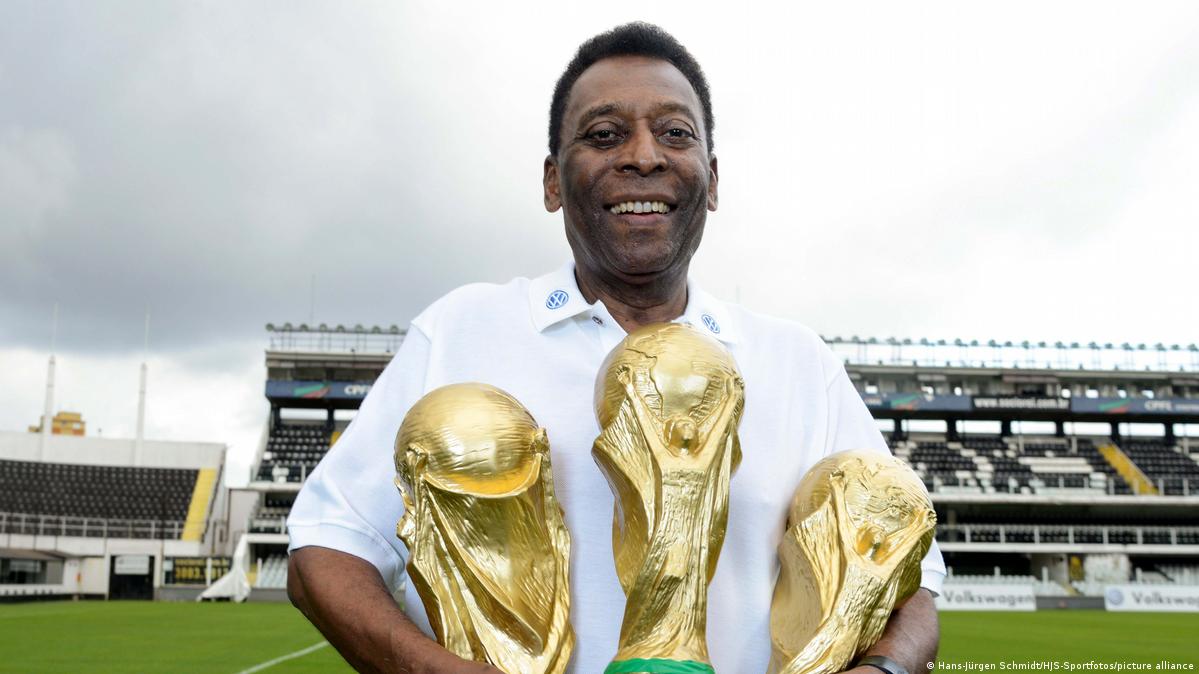FIFA will ask every country in the world to name a stadium in honour of Pelé, its president, Gianni Infantino, said on Monday, January 2, 2023.
Pelé, the Brazil great who won the World Cup three times and scored more than 1,000 goals, died last Thursday aged 82.
Infantino, who is in Brazil for Pelé’s funeral, told local reporters: “We’re going to ask every country in the world to name one of their football stadiums with the name of Pelé.”
In April 2021 Rio de Janeiro abandoned plans to name the famous Maracanã stadium after Pelé after it was vetoed by the state governor.
Pelé’s coffin was placed inside the Vila Belmiro stadium in Santos on Monday, the home ground of the club where he spent virtually his entire career.
Infantino released a statement on the day of Pelé’s death which began: “For everyone who loves the beautiful game, this is the day we never wanted to come. The day we lost Pelé.”
Global Football Icon, Pelé, Dies At 82
He was hailed as the king of soccer, but it was Pelé’s other nickname — the Pérola Negra, or Black Pearl — that best evoked the rare brilliance he packed into his diminutive frame. Pelé, who for decades staked a claim as the world’s most celebrated athlete, died, Thursday, December 29, 2022, at 82.
His manager Joe Fraga confirmed the death to the Associated Press. Additional details were not immediately available, but Pelé had been hospitalized in São Paulo, Brazil, for the past month, undergoing treatments for colon cancer.
Pelé’s eminence in soccer spanned three decades in which he helped Brazil win World Cup titles in 1958, 1962, and 1970. Quick, agile, adept with both feet, and laserlike with his headers, Pelé was built for scoring and blessed with a jazz master’s improvisational skills on the soccer pitch.
During his 22-year professional career, Pelé appeared in more than 1,300 matches and scored almost as many goals, yet he was hardly a one-man show. He saw the field the way a chess champion sees the board — two, three, four moves ahead — with the tactical savvy to pass to teammates better positioned to strike.
He was barely 20 when the president of Brazil proclaimed him an official national treasure. It was an honorific and an economic restraint; it barred him from being transferred to a wealthy European club willing to pay hugely for his services. Pelé was an asset too essential to the national interest to export.
Nonetheless, born and reared in poverty, the soccer champion formally known as Edson Arantes do Nascimento was among the world’s first athletes to recognize the power and riches of the personal brand.
Later in his career, after retiring from Brazilian club Santos, which was the country’s dominant team in the 1960s, Pelé took his global aura to America, signing with the New York Cosmos of the North American Soccer League in 1975, when he was in his mid-30s. The deal was reportedly brokered by Secretary of State Henry Kissinger, one of Pelé’s ardent admirers and a believer in the international goodwill spawned by “the beautiful game.”
The genius of Pelé’s play prompted a 48-hour cease-fire in at least one civil war as Nigerians put their arms down to behold his mastery during a 1969 exhibition in Lagos.
It wasn’t just Pelé’s skill that transcended boundaries; so, too, did his fame. He never knew the origin of his nickname. “Pelé” has no meaning in Portuguese, but it was simple enough for a child to pronounce and make itself understood in all languages, as did Pelé’s signature smile.
As he remarked in a 2001 interview, “Wherever you go, there are three icons that everyone knows: Jesus Christ, Pelé, and Coca-Cola.”
A year earlier, the international governing body of soccer, FIFA, named Pelé and Argentina’s Diego Maradona co-players of the 20th century. The question of who was the game’s greatest of all time — Pelé, with his three World Cup titles, or Maradona, with his one championship in four World Cup appearances — roiled passions well beyond South America. It was a debate that offended Pelé.
Source: The Guardian







